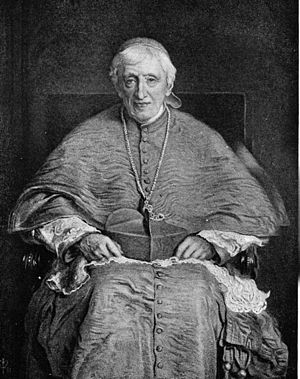I am visiting the Benedictine Abbey of St Anselm (Washington, DC) to get away from "stuff" where I normally live. Life there is particularly tense these days. A topic for another time. Time in quiet, time in prayer, time to think, to ponder bigger questions, time to read and to enjoy life in a different key for a short time. Life is fine. It won't last long, don't worry. I have friends here. Yesterday I was trying to understand happiness. Newman gave perspective. Today, I am trying to understand my place is a world of utter chaos, not exclusively my own chaos but more importantly the world's.
At breakfast another guest at the abbey said he thought the US was heading to another civil war. I received an email and later texts that the two year old son of a friend is in the hospital with a serious ear infection, an acute illness that has made itself a longtime, and unwelcomed guest in this person's life; there is also the fact that we are working toward the conclave but problems that need discussion, and the list goes on. This afternoon I sat for an hour with my friend Aidan, the abbot-emeritus of this abbey, who is just a delight to speak converse with, and who is living with the grace of Parkinson's. (Blessed John Paul II, pray for Aidan!) Aidan can track a conversation for the most part; he loses words and can be side-tracked; but he's capacity for friendship is great.
BUT what am I supposed to do? How do I approach the reality of life? Where is God leading me, why, and for what reason? Do I have a part to play in life? Newman has a helpful answer...
1. God was all-complete, all-blessed in Himself; but it was His will to create a world for His glory. He is Almighty, and might have done all things Himself, but it has been His will to bring about His purposes by the beings He has created. We are all created to His glory--we are created to do His will. I am created to do something or to be something for which no one else is created; I have a place in God's counsels, in God's world, which no one else has; whether I be rich or poor, despised or esteemed by man, God knows me and calls me by my name.
2. God has created me to do Him some definite service; He has committed some work to me which He has not committed to another. I have my mission--I never may know it in this life, but I shall be told it in the next. Somehow I am necessary for His purposes, as necessary in my place as an Archangel in his--if, indeed, I fail, He can raise another, as He could make the stones children of Abraham. Yet I have a part in this great work; I am a link in a chain, a bond of connexion between persons. He has not created me for naught. I shall do good, I shall do His work; I shall be an angel of peace, a preacher of truth in my own place, while not intending it, if I do but keep His commandments and serve Him in my calling.





